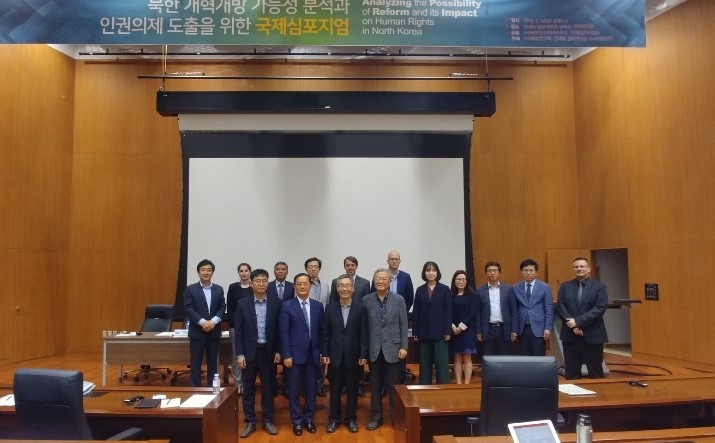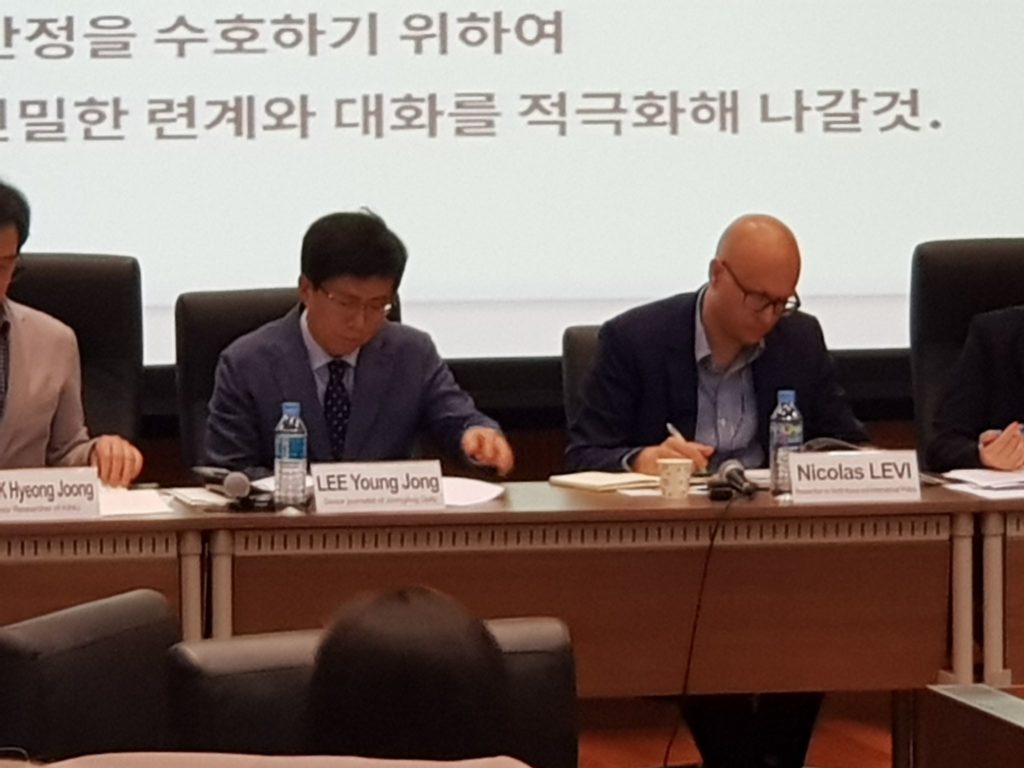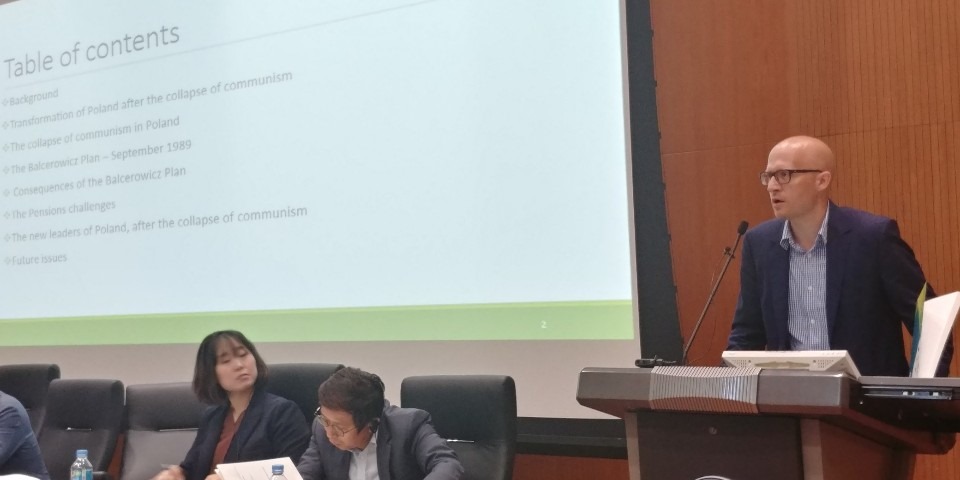
Speech by dr. Nicolas Levi contained reflections on Balcerowicz’s plan called “shock therapy”. It was a plan of Poland’s transition to a market economy after political liberalization in 1989. The seminar “Analyzing the Possibility of Reform and its Impact on Human Rights in North Korea” took place on May 24 at the prestigious Yonsei University in Seoul, South Korea.


czytaj więcej
Charitable activities of the Vietnamese in Poland: their scope and sources
The scale of assistance provided to medics by the Vietnamese community during the 2020 pandemic inspires admiration and gratitude. It stems from the sense of belonging to Poland and deeply rooted in the culture order to help those in need and repay the debt incurred at the time when they themselves needed such help.
Ewa GrabowskaOnline Course: “Conflict Resolution and Democracy”
The course will be taught via interactive workshops, employing the Adam Institute’s signature “Betzavta – the Adam Institute’s Facilitation Method“, taught by its creator, Dr. Uki Maroshek-Klarman. The award-winning “Betzavta” method is rooted in an empirical approach to civic education, interpersonal communication and conflict resolution.
The strategic imperatives driving ASEAN-EU free trade talks: colliding values as an obstacle
Recently revived talks aimed at the conclusion of an inter-regional free trade agreement between the Association of Southeast Asian Nations (ASEAN) and the European Union (EU) are driven by strategic imperatives of both regions.
Robin RamcharanPeace and development as the call of our day again face severe challenges on a global scale, with more prominent instability, uncertainty and complexity
Yiwei WangTime for a new normal – enhancing Europe’s military profile in the Indo-Pacific in 2025
2024 witnessed a notable stepping up of Europe’s military profile in the Indo-Pacific. Building on these developments, 2025 should be a year of continuation, bringing even more defence engagement of European states with their Indo-Pacific partners.
Jakub WitczakTo free oneself from the Chinese embrace. On Indo-Russian relations with Nandan Unnikrishnan
Interview with Nandan Unnikrishnan, who has served for many years as a correspondent for Indian media in Russia. Currently he is a research fellow at the Observer Research Foundation in Delhi. The interview was conducted during the Raisina Dialogue 2019 in Delhi.
Krzysztof ZalewskiIndian dream – interview with Samir Saran
Krzysztof Zalewski: India is a large country, both in terms of its population and its land area, with a fast-growing economy. It is perceived as a major new player on the global stage. What would the world order look like if co-organized by India? Samir Saran: India’s impact on the world order is already significant, but […]
Krzysztof ZalewskiWomen’s liberation in China: interview with prof. Wu Lijuan
Interview of Ewelina Horoszkiewicz with prof. Wu Lijuan - Associate Professor at the Department of Sociology at Peking University. Her research concentrates on the gender issues and social changes brought about by globalization. She wrote a book “Job Placements and Job Shifts in China: The Effects of Education, Family Background and Gender”.
Ewelina HoroszkiewiczGlobalization of business, education and China: interview with prof. Chiwen Jevons Lee
Interview of Ewelina Horoszkiewicz with prof. Chiwen Jevons Lee on China on globalization of Chinese business education and his thoughts of China’s role in the global marketplace.
Ewelina HoroszkiewiczGuidance for Workplaces on Preparing for Coronavirus Spread
Due to the spread of coronavirus, the following workplace recommendations have been issued by the Ministry of Development, in cooperation with the Chief Sanitary Inspector. We also invite you to read article about general information and recommendations for entrepreneurs.
Central Asia. The winding road to regional integration
The aim of the paper is to present the current stage of integration among the Central Asian republics and to analyze directions and dynamics of this process in the nearest future. This study also attempts to identify factors which can either slow down or strengthen the process of integration as well as its causes and consequences.
Jerzy OlędzkiFrom ‘strategic engagement’ to ‘competition’. Interview with William Yu
Ewelina Horoszkiewicz in conversation with Professor William Yu (UCLA) on USA, China and Europe. Professor William Yu is an economist with the UCLA Anderson Forecast and specializes in the economies of Los Angeles and China.
Ewelina HoroszkiewiczThe countries of the Indochinese Peninsula are struggling with the problem of the deteriorating state of the Mekong River, which scientists and publicists are increasingly boldly describing as an ecological disaster. Alongside climate change, existing hydropower plants and those under construction in China and Laos are among the greatest threats. These ventures deepen the regional dispute over a river crucial to communities of tens of millions of people.
Jakub KamińskiMeeting with Dr. Uki Maroshek-Klarman
It’s a great pleasure for the Boym Institute to organize an open meeting with dr Uki Maroshek who founded the betzavta method. Betzavta is taught across the globe at the Adam Institute for Democracy and Peace in Jerusalem as well as in other institutions in Europe and the Middle East.
Coronavirus (COVID-19) outbreak and emerging contractual claims
With China one of the key players in the global supply chain, supplying major manufacturing companies with commodities, components and final products, the recent emerging outbreak of Coronavirus provides for a number of organizational as well as legal challenges.
Patrycja Pendrakowska made it to the Top 40 under 40 Europe-India leaders list
#EuropeIndia40, an initiative of EICBI, covers the stories of leaders below the age of 40 and their contributions to promoting EU India / UK India relations.
The Boym Institute contribution to the Transcultural Caravan project
We are pleased to announce, that our analysts and contributors are among authors of the newest publication - "European Perspectives on the New Silk Roads – A Transcultural Approach".
How to deal with gender-based segregation?
Interview on the project Supporting the Economic Empowerment of Afghan Women through Education and Training in Kazakhstan and Uzbekistan. Magdalena Sobańska-Cwalina and Krzysztof M. Zalewski (The Boym Institute) in discussion with: Yakup Beris, Johannes Stenbaek Madsen, Maria Dotsenko, Gulnar Smailova,
Zespół Instytutu BoymaPatrycja Pendrakowska and Paweł Behrendt on navigating Sino-Polish relations
We are proud to annouce, that Patrycja Pendrakowska and Paweł Behrendt made a contribution to the latest project of the Baltic Security Foundation, The Jamestown Foundation and the Baltic-American Freedom Foundation.
Indonesia – between religion and democracy
Indonesia is the largest Muslim democracy in the world. Approximately 88% of the population in Indonesia declares Islamic religion, but in spite of this significant dominance, Indonesia is not a religious state.
Anna GrzywaczAiluna Shamurzaeva – Research Fellow at the Boym Institute
Her research focuses on political economy, migration studies, and international trade. Ailuna, we are more than happy to welcome you to the team!
Polish-Macanese Artist Duo Presents New Works in Lisbon
Artist couple Marta Stanisława Sala (Poland) and Cheong Kin Man (Macau) will present their latest works in the exhibition “The Wondersome and Peculiar Voyages of Cheong Kin Man, Marta Stanisława Sala and Deborah Uhde”, on view at the Macau Museum of the Macau Scientific and Cultural Centre (CCCM) in Lisbon, from 5 June to 6 July 2025.
At the Boym Institute we are coming out with new initiative: #WomeninBoym, which aims to show the activity of this – often less visible – half of society. We will write about what women think, say and do. We will also publicise what women are researching and writing.
The Boym Institute message to Chinese policymakers and analysts
The EU-China relations require common perspective on Russia’s invasion on Ukraine

